On January 6 the TV show Grimm begins its sixth and final season. As a fan I’m disappointed to see the show end. Worse, the final season is half its normal length. But I’ll take what I can get. At least the story will come to an end instead of terminating abruptly, and I’ll find out what happens to the characters. I especially wonder about Juliette Silverton (Bitsie Tulloch), the hero’s girlfriend. She’s had a rough five years. From the start I’ve harbored the uneasy feeling that the show’s writers aren’t quite sure what to do with her. She’s too important to the narrative to remain static. She has to change. But how?
The saga of Juliette
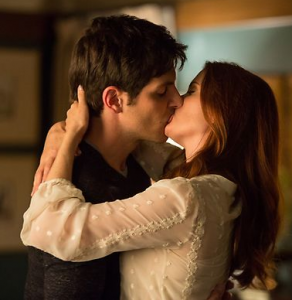 A perky veterinarian, Juliette lives with Detective Nick Burkhardt in a delightful old house in Portland, Oregon. Life is good. Then Nick begins seeing people’s faces change into monsters. He thinks he’s going nuts and doesn’t tell anybody. Shortly thereafter, his Aunt Marie (Kate Burton) shows up with an Air Stream trailer full of weird artifacts and some news for Nick. Grimm’s fairy tales are real and he’s a Grimm. Like many of his ancestors he has the ability to see various species of monsters called Wesen.
A perky veterinarian, Juliette lives with Detective Nick Burkhardt in a delightful old house in Portland, Oregon. Life is good. Then Nick begins seeing people’s faces change into monsters. He thinks he’s going nuts and doesn’t tell anybody. Shortly thereafter, his Aunt Marie (Kate Burton) shows up with an Air Stream trailer full of weird artifacts and some news for Nick. Grimm’s fairy tales are real and he’s a Grimm. Like many of his ancestors he has the ability to see various species of monsters called Wesen.
They look like ordinary humans, but under duress Wesen show their true forms. Sometimes the transformation becomes so complete that ordinary people see them too. Hence the legends about werewolves etc. Some Wesen are dangerous and predatory, and Nick’s duty as a Grimm is to hunt them down and kill them. As a cop he already chases bad guys, so that’s handy.
Nick’s new identity spells the beginning of disaster for Juliette. She gradually becomes aware that he’s hiding something and their relationship suffers. Then one of his enemies, the Hexenbiest (witch) Adelind Schade (Claire Coffee), casts a spell on Juliette, a weird coma beyond the doctors’ understanding. This plot twist takes Juliette out of action for several episodes.
The writers could have let her die, but that would be too easy
Nick’s boss, Captain Sean Renard (Sasha Roiz), happens to be a Zauberbiest, the male equivalent of a Hexenbiest. At first he’s in league with Adelind and her mother against Nick. Later he allies himself with Nick against “the Royals,” European aristocrats who use Wesen to maintain their power. As the King’s bastard son, Sean has never had a comfortable relationship with his family.
 Sean and Adelind’s mother devise a spell to awaken Juliette. Unfortunately it has side effects. Juliette doesn’t remember who Nick is and she develops a sexual obsession with Sean. (Before your imagination runs wild, keep in mind this is NBC, not HBO.)
Sean and Adelind’s mother devise a spell to awaken Juliette. Unfortunately it has side effects. Juliette doesn’t remember who Nick is and she develops a sexual obsession with Sean. (Before your imagination runs wild, keep in mind this is NBC, not HBO.)
By the time everything is sorted out, Juliette’s life has radically changed. She lives in a world of monsters. Even Nick’s friends, the perfectly nice couple Monroe and Rosalie (Silas Weir Mitchell and Bree Turner), are Wesen. But Juliette adapts. She becomes a team player in the ongoing battle against the Royals and various species of evil Wesen. The trouble is she doesn’t have much to do. Her knowledge as a vet occasionally comes in handy, but without magical powers or physical prowess, she can’t do much.
Adelind strikes again
 After Nick takes away her Hexenbiest powers, Adelind endures an arduous and disgusting ceremony to regain them and proceeds to take away his Grimm powers. Hey, tit for tat. It’s only fair. With a magic potion she takes Juliette’s form and seduces Nick, who acts surprised when she comes on to him. I get the sense that Nick and Juliette’s love life hasn’t exactly been on fire.
After Nick takes away her Hexenbiest powers, Adelind endures an arduous and disgusting ceremony to regain them and proceeds to take away his Grimm powers. Hey, tit for tat. It’s only fair. With a magic potion she takes Juliette’s form and seduces Nick, who acts surprised when she comes on to him. I get the sense that Nick and Juliette’s love life hasn’t exactly been on fire.
Now that Nick is no longer a Grimm, Juliette hopes for a normal life. No such luck. He’s now helpless against his enemies. Nor can he protect Monroe and Rosalie from the Wesen Nazis who consider their mixed marriage an abomination. (Rosalie is foxy and Monroe is wolfish.) The only way to regain his powers is to reproduce Adelind’s spell. Ever the good sport, Juliette drinks the potion, takes Adelind’s form, and has sex with Nick.
And turns into a Hexenbiest herself.
As one might expect, the transformation is disastrous for her relationship with Nick. Nor does it do wonders for her personality. Once perky and sweet, she becomes sarcastic, jealous, and vindictive—like a witch should be. When Adelind ends up pregnant with Nick’s child from their single encounter, Juliette flies into a rage. She’s on the brink of killing Nick when his Grimm apprentice, Trubel (Jacqueline Toboni), brings her down with an arrow from a crossbow.

Of course Juliette doesn’t die
She’s spirited away by a secret organization devoted to fighting a secret organization of Wesen trying to take over the world. (The organization is called Black Claw like the daemon enforcer in my Daemon World series, so I must point out that my daemon existed long before Grimm‘s secret organization. If anything, they borrowed the name from me.) After extensive conditioning, Juliette reemerges into the narrative as Eve, a Hexenbiest who does nothing but fight. A weapon without life or personality, she appears not to care that Nick has hooked up with Adelind. Maybe she would have been better off dead.

But here comes another twist. In the final episode of season five, Juliette is grievously wounded and healed through the power of a mysterious artifact. In the process she changes and becomes . . . what?
Poor Juliette. Human beings are merely at the mercy of fate. TV characters are at the mercy of script writers.
Photos from fanpop.com and NBC.






 Jax finds himself torn between his father’s idealism, as revealed in the journal he left, and the hard pragmatism and ambition of Clay and Gemma. His ambivalence about the club’s criminal enterprises drives much of the conflict within the family. There are echoes of Hamlet, with Jax as the brooding son and Clay as the uncle who has taken his dead brother’s wife. Gemma, however, is no foolish Queen Gertrude. She’s more like Lady Macbeth without the guilt.
Jax finds himself torn between his father’s idealism, as revealed in the journal he left, and the hard pragmatism and ambition of Clay and Gemma. His ambivalence about the club’s criminal enterprises drives much of the conflict within the family. There are echoes of Hamlet, with Jax as the brooding son and Clay as the uncle who has taken his dead brother’s wife. Gemma, however, is no foolish Queen Gertrude. She’s more like Lady Macbeth without the guilt. When Jax marries his childhood sweetheart, Tara (Maggie Siff), Gemma’s connection to her son is threatened. A skilled surgeon, Tara stitches up the Sons’ gunshot wounds and learns to shoot a gun, but she doesn’t want the outlaw life for their children. She urges Jax to abandon the Sons. He also wants something better, but his loyalty to the club and lack of middle-class job skills keep him from walking away. After Clay cedes the presidency to him, he tries to move Sons out of gunrunning and into pornography, a less violent business, but various forces work against against him. Tenuous alliances with other gangs and with the IRA suppliers depend on the continued arms trade. Feuds with other gangs and various federal investigations require his immediate attention. And both Gemma and Clay want things to remain as they are.
When Jax marries his childhood sweetheart, Tara (Maggie Siff), Gemma’s connection to her son is threatened. A skilled surgeon, Tara stitches up the Sons’ gunshot wounds and learns to shoot a gun, but she doesn’t want the outlaw life for their children. She urges Jax to abandon the Sons. He also wants something better, but his loyalty to the club and lack of middle-class job skills keep him from walking away. After Clay cedes the presidency to him, he tries to move Sons out of gunrunning and into pornography, a less violent business, but various forces work against against him. Tenuous alliances with other gangs and with the IRA suppliers depend on the continued arms trade. Feuds with other gangs and various federal investigations require his immediate attention. And both Gemma and Clay want things to remain as they are.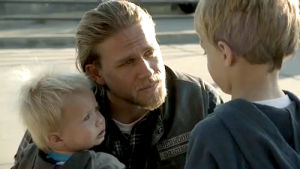
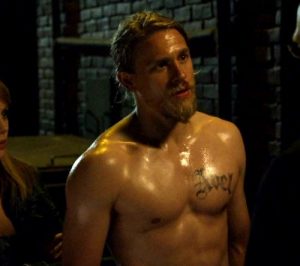





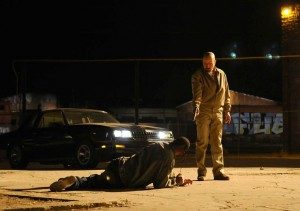 Near the end of season three, Walter casually plugs a bullet into the head of a man lying wounded in the street.
Near the end of season three, Walter casually plugs a bullet into the head of a man lying wounded in the street.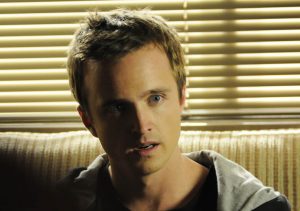 I can’t help liking this renegade high-school teacher. He doesn’t have Dexter’s animal magnetism or Jax’s slinky sexiness. He has the face of a guy who should have started using sunscreen decades ago. If he’s going parade around in his underwear, he needs to take up Pilates or weight-lifting. For viewers who want sexy, there’s his partner, Jesse, played by Aaron Paul. But Cranston brings such compelling and charismatic energy to the role that I have to get behind Walter. I hope he resists the urge to destroy himself. I hope he crushes his enemies, ends up with piles and piles of cash, and enjoys a quiet retirement, his cancer in remission. One evening he’ll be eating dinner at a posh restaurant where the jerk who snapped his picture at the carwash now works as a busboy. Walter could give him a hard time, even kill him. But why bother? Stepping on the little jerk would mean getting shit on his shoe.
I can’t help liking this renegade high-school teacher. He doesn’t have Dexter’s animal magnetism or Jax’s slinky sexiness. He has the face of a guy who should have started using sunscreen decades ago. If he’s going parade around in his underwear, he needs to take up Pilates or weight-lifting. For viewers who want sexy, there’s his partner, Jesse, played by Aaron Paul. But Cranston brings such compelling and charismatic energy to the role that I have to get behind Walter. I hope he resists the urge to destroy himself. I hope he crushes his enemies, ends up with piles and piles of cash, and enjoys a quiet retirement, his cancer in remission. One evening he’ll be eating dinner at a posh restaurant where the jerk who snapped his picture at the carwash now works as a busboy. Walter could give him a hard time, even kill him. But why bother? Stepping on the little jerk would mean getting shit on his shoe.


